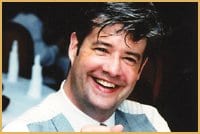“He used to rub my bald head for good luck,” says David Ryniker, who laughs and then gets quiet. “I still can’t believe he’s gone.”
Ryniker, an anthropology professor at the University of British Columbia (UBC), is mourning the loss of his dear friend and HIV/AIDS nurse and activist, Andrew Johnson. It’s the silent moments — between the bouts of contagious laughter — that illuminate his profound grief.
The two met in 1992 while attending graduate school at UBC — Rynicker studying anthropology, Johnson, nursing. Ryniker reveals tales of university hijinks that only friends who know you well can tell, and get away with telling. He talks of younger days, good times and hard times, work and church; pausing now and then to realize the tremendous hole now left in his life.
“It’s inconceivable to me that I just can’t call him. I used to drunk dial him when he wouldn’t go out with me,” he laughs.
“Andrew was animated in his sleep. What everybody shied away from, Andrew could do.”
Johnson worked through grad school as a home care community nurse for people living in Vancouver’s Downtown Eastside.
He spent the last days of his life doing what he always did: helping others. He was splitting his time between working at St Paul’s Hospital and caring for an ailing friend.
“Andrew was somebody that we could all count on. He was a good friend and very caring,” says Ryniker, recalling the last conversation the two had. Concerned with Johnson’s own ill health — due to a long battle with Lupus — Ryniker told Andrew to go home, get some rest and he would keep a watchful eye on their sick friend.
Johnson, a steadfast advocate in the national and global fight against HIV/AIDS, would later be found in his West End apartment, deceased at age 46 of a cardiac aneurism.
To say Andrew Johnson was tireless would be an understatement. To his colleagues he was enthusiasm personified. To his friends, he was the perfect combination of class and brash.
“He was nonsense and no-nonsense at the same time. He could be wild and crazy and then know where the limits were. He was married to his work. He lived for what he did,” says Ryniker.
Johnson first worked with individuals living with HIV/AIDS in 1989. He was a nursing student in Toronto and had been assigned to a practicum at the Casey House Hospice, under the guidance of Deborah Randell-Wood.
“He had his own perspective on how to do things,” says Randell-Wood, now director of the Health Care Provider Network in Ontario. “He was an extraordinarily talented student. He had an understanding of how to care. The technical parts and things you can teach people, but the genuine caring, you just have.
“He was warm and funny without making light of anything that was happening in people’s lives.”
In 1990, Johnson became community coordinator for a national survey on HIV/AIDS and gay men’s health; his job was to survey various venues where gay men congregated.
“He used to say that he was the only gay man in Canada who had been to every bar, club and bathhouse in the country, and then some if you throw in a few house parties,” says Rick Marchand, friend, colleague and directing manager of the Community Based Research Centre (CBRC).
From there, Johnson served on the board of directors of AIDS Vancouver and became its executive director in 1998. He was later one of the founding members of the CBRC and established the centre’s research ethics board. Also a founding member one of the Canadian Association of Nurses in AIDS Care, he went on to be association president in 2001.
Johnson spent the last seven years working as a nurse and nursing educator at the Dr Peter Centre, Vancouver Community College, St Paul’s Unit 10C, and the John Ruedy Immunodeficiency Clinic.
Johnson’s extensive research and teachings will also live on through his handbook Living with Dying, Dying at Home: An AIDS care team resource manual, published in 1994 by the AIDS Committee of Toronto and Project Access. Johnson wrote the guide as a source of information for people living with AIDS and wanting to die at home, as well as for their caregivers.
“What Andrew has left behind is the awareness that these issues are important — that people are important — especially people in need,” says Randall-Wood.
“He’s probably in heaven organizing and fundraising,” says Rynicker.

 Why you can trust Xtra
Why you can trust Xtra


